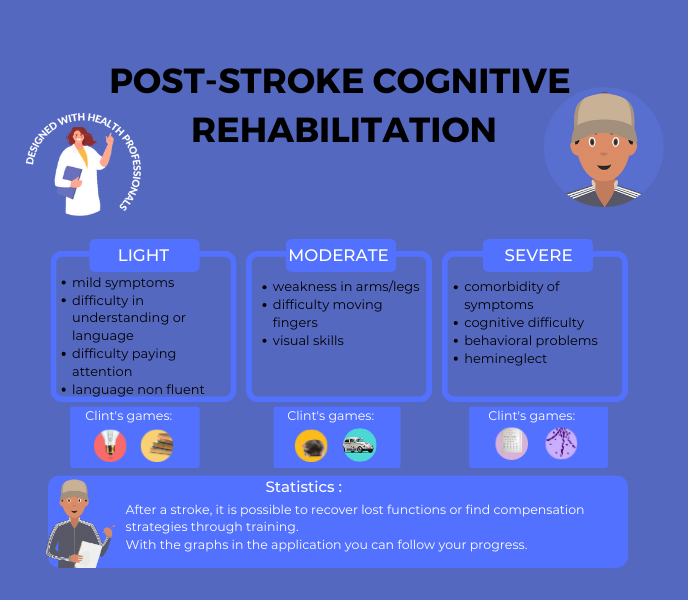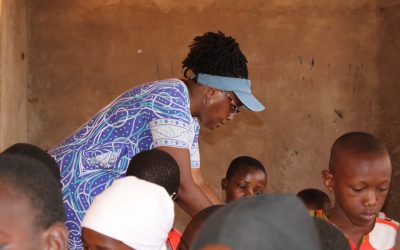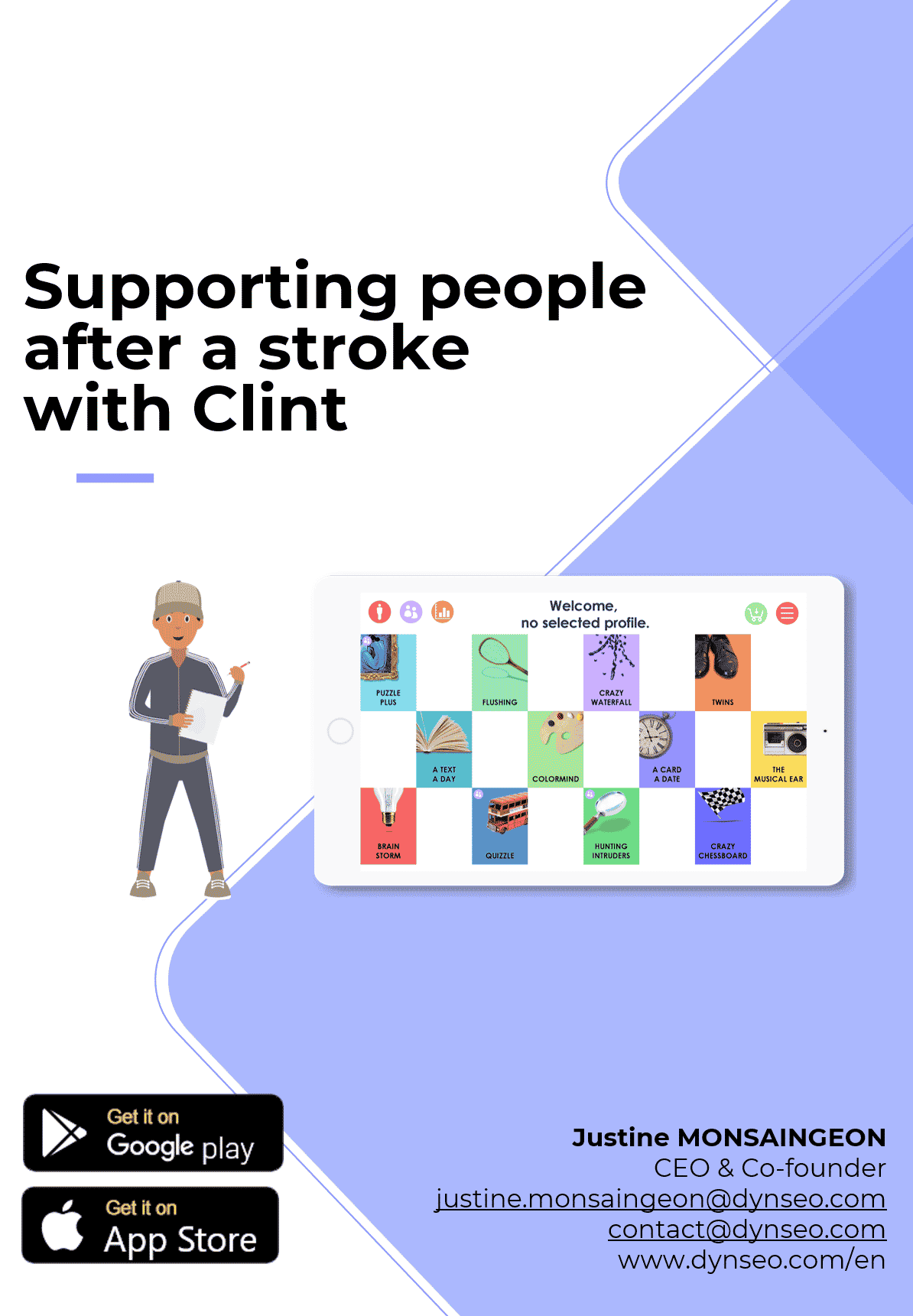A stroke, often referred to as a “brain attack,” occurs when blood flow to a part of the brain is interrupted or reduced, leading to damage or destruction of brain cells. The impact of stroke on survivors is profound, often resulting in physical, emotional, and cognitive challenges that can alter the course of their lives. From paralysis to speech difficulties and memory loss, the effects can be devastating, requiring immense resilience and determination to overcome.
Success stories from stroke survivors serve as beacons of hope, illuminating the journey of recovery and showcasing the triumph of the human spirit. These narratives not only highlight the resilience of individuals in the face of adversity but also offer invaluable insights and inspiration to others navigating similar paths. Through shared experiences, strategies, and achievements, these stories aim to foster a sense of community, empowerment, and optimism among survivors and their loved ones. In essence, they embody the unwavering strength and potential for renewal that reside within every stroke survivor.
Overcoming Adversity
Overcoming adversity requires an unwavering spirit and a steadfast resolve to persevere against all odds. Personal accounts of survival paint a vivid picture of the human capacity for resilience in the face of overwhelming challenges. Initially, stroke survivors grapple with a myriad of obstacles, ranging from physical disabilities to emotional turmoil and cognitive impairments. Despite the daunting road ahead, their determination and resilience shine through as guiding beacons, propelling them forward on the path to recovery. With unwavering resolve and a relentless pursuit of improvement, they confront each hurdle with courage and fortitude. These narratives serve as powerful reminders of the indomitable strength of the human spirit, inspiring others to confront their own adversities with hope, courage, and resilience.
Road to Recovery
The road to recovery from a stroke is often long and challenging, marked by various milestones in rehabilitation and emotional healing. The rehabilitation process encompasses a comprehensive approach tailored to each individual’s needs, integrating physical therapy, occupational therapy, and speech therapy to address the diverse array of challenges faced by survivors. Physical therapy milestones, such as regaining motor function and improving balance and coordination, serve as tangible markers of progress and achievement along this journey. Equally important is the aspect of emotional healing, which relies on robust support systems comprising family, friends, healthcare professionals, and support groups. These networks offer invaluable emotional support, encouragement, and guidance, nurturing the survivor’s resilience and empowering them to navigate the complexities of their recovery journey with strength and determination.
Regaining Independence
Regaining independence after a stroke is a significant milestone that entails learning to adapt to new realities while embracing assistive technologies and aids. Survivors often embark on a journey of discovery, exploring innovative tools and techniques that facilitate their daily activities and enhance their quality of life. From mobility devices to communication aids, assistive technologies play a pivotal role in restoring autonomy and confidence. Learning to navigate these resources effectively empowers survivors to reclaim control over their lives and pursue their aspirations with renewed vigor. Achieving milestones in daily life, whether it’s mastering a new skill or accomplishing routine tasks independently, serves as a testament to their resilience and determination. Through perseverance and innovation, stroke survivors exemplify the transformative power of adaptation and the triumph of the human spirit over adversity.
Support Networks and Resources
Support networks and resources play a vital role in the journey of stroke survivors, offering invaluable assistance and encouragement along the path to recovery. Family and friends serve as pillars of strength, providing unwavering support, empathy, and companionship throughout the challenging phases of rehabilitation and emotional healing. In addition to personal networks, community support groups offer a unique platform for survivors to connect with others who understand their experiences firsthand, fostering a sense of belonging and camaraderie. These groups provide opportunities for sharing insights, coping strategies, and mutual encouragement, reinforcing the belief that no one is alone in their journey. Accessing medical and therapeutic resources is also crucial, enabling survivors to benefit from specialized care, rehabilitation programs, and cutting-edge treatments tailored to their unique needs. By harnessing the collective support of these networks and resources, stroke survivors can navigate the complexities of their recovery journey with resilience, optimism, and empowerment.
Psychological Transformation
The journey of stroke recovery often entails a profound psychological transformation as survivors navigate the myriad challenges and changes brought about by their experience. Coping with the aftermath of a stroke requires a fundamental reshaping of one’s mindset and outlook on life. It involves coming to terms with newfound limitations, grappling with feelings of loss and frustration, and embracing the process of adaptation and acceptance. Psychological transformation encompasses not only the acknowledgment of physical changes but also the cultivation of resilience, optimism, and a renewed sense of purpose. Through introspection, support, and personal growth, survivors embark on a transformative journey of self-discovery, discovering inner strengths and resources they never knew they possessed.
Coping with Post-Stroke Changes
Coping with post-stroke changes is a multifaceted process that encompasses emotional, physical, and cognitive adjustments. Survivors often encounter a plethora of changes, ranging from physical disabilities and speech impairments to memory loss and emotional upheaval. Coping strategies may include seeking professional counseling, engaging in adaptive therapies, and drawing strength from support networks. It’s a journey of exploration and adaptation, as survivors learn to navigate the complexities of their new reality while embracing their inherent resilience and determination. By acknowledging their vulnerabilities and embracing a mindset of growth and acceptance, stroke survivors embark on a path of self-discovery and empowerment, gradually finding equilibrium amidst the tumult of change.
Finding Purpose and Meaning
Finding purpose and meaning in the aftermath of a stroke is a transformative journey that involves introspection, resilience, and a redefinition of one’s priorities and aspirations. Amidst the challenges and uncertainties, survivors seek to rediscover their sense of identity and fulfillment, forging new paths and embracing fresh opportunities for growth and contribution. Whether through creative pursuits, volunteer work, or advocacy efforts, survivors tap into their innate resilience and resourcefulness, cultivating a renewed sense of purpose and direction. By aligning their actions with their values and passions, they discover profound meaning in their journey of recovery, inspiring others with their courage, resilience, and unwavering determination.
Mental Health and Well-being Strategies
Maintaining mental health and well-being is paramount for stroke survivors as they navigate the complexities of recovery and adjustment. Strategies for promoting mental health include engaging in regular physical activity, practicing mindfulness and relaxation techniques, and fostering social connections. Additionally, seeking professional support from therapists or support groups can provide invaluable guidance and encouragement. By prioritizing self-care and cultivating a positive mindset, survivors empower themselves to navigate the emotional ups and downs of their journey with resilience and grace. Through a holistic approach to mental well-being, they lay the foundation for a fulfilling and meaningful life beyond the confines of their stroke experience.
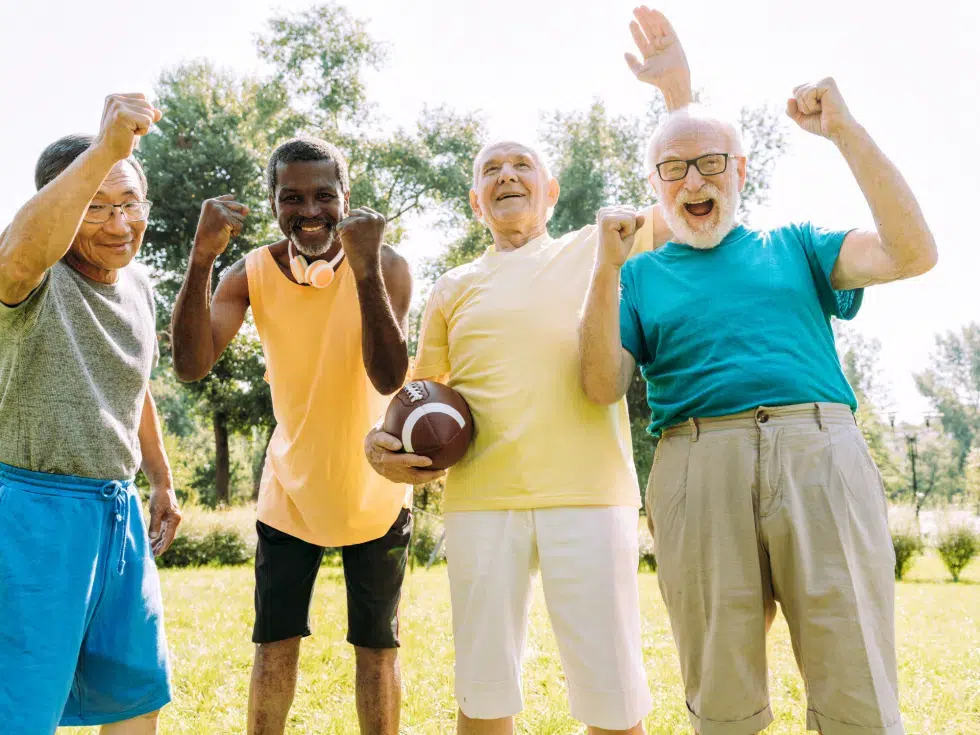
Inspiring Testimonials
Hearing the stories of those who have navigated the challenging waters of stroke recovery can be incredibly uplifting and motivating. Their journeys, marked by determination, resilience, and hope, offer valuable insights and encouragement to others on similar paths. Below are heartfelt testimonials crafted to reflect the diverse experiences of stroke survivors, celebrating their victories and the lessons learned along the way.
Elena’s Story: Rediscovering Joy in Movement “After my stroke, I thought I’d never find joy in movement again. Every step was a battle, and frustration often got the better of me. But with each physical therapy session, I started noticing small improvements—a little less wobble, a bit more strength. Six months in, I took my first unassisted steps in my garden. The feeling was indescribable; it was as if I was learning to dance with life again. To anyone facing this journey, remember, progress is made one step at a time. Embrace the small victories; they lead to big triumphs.”
Marcus’s Tale: The Power of Perseverance “I’ve always been a fighter, but recovering from a stroke tested my limits like nothing else. There were days I wanted to give up, days when improvement seemed impossible. But I kept pushing, driven by the support of my family and the dedication of my rehab team. One year later, I completed a 5K walk—a goal that once seemed unreachable. My message to fellow survivors is simple: never underestimate the power of perseverance. Your strength is greater than you know.”
Jasmine’s Reflection: Finding Strength in Vulnerability “Before my stroke, I prided myself on my independence. Admitting I needed help was something I found incredibly difficult. But this journey taught me the strength in vulnerability. Opening up to others about my struggles and accepting their support was a turning point in my recovery. It made me realize that we’re stronger together. To anyone struggling to ask for help, know that it’s okay to lean on others. It’s not a sign of weakness, but a step towards healing.”
Alex’s Insight: Celebrating Every Milestone “Recovery is a marathon, not a sprint. I learned to celebrate every milestone, no matter how small it seemed. Whether it was managing to button my shirt or completing a speech therapy session without getting frustrated, each achievement was a step towards reclaiming my life. These small victories kept me motivated and reminded me of the progress I was making. To those in the midst of recovery, celebrate your milestones. They are reminders of your resilience and indicators of the progress yet to come.”
Sophia’s Message: Embracing a New Perspective “My stroke forced me to slow down and reassess my life’s priorities. Through the grueling process of rehabilitation, I discovered resilience I didn’t know I had and forged connections with incredible people who walked the path with me. This journey, as challenging as it was, taught me the true value of health, community, and perseverance. I’ve emerged not just stronger, but with a new appreciation for the preciousness of life. To anyone facing this journey, know that there’s light at the end of the tunnel, and sometimes, through our greatest trials, we find our most profound strengths.”
These testimonials, each unique in its own right, weave a tapestry of hope, resilience, and shared humanity. They stand as a testament to the strength that lies within all of us to overcome adversity and to the transformative power of sharing our stories.
Promoting Awareness and Education
Promoting awareness and education about stroke is paramount in empowering individuals to recognize its signs, prevent its occurrence, and advocate for improved care. Sharing personal experiences serves as a powerful tool in raising awareness, and shedding light on the realities faced by stroke survivors and their families. Through storytelling and outreach efforts, survivors impart valuable insights into the physical, emotional, and cognitive challenges of stroke, fostering empathy and understanding within communities. Education plays a crucial role in stroke prevention, equipping individuals with knowledge about risk factors, healthy lifestyle choices, and early intervention measures. Moreover, advocacy efforts aimed at enhancing stroke care and rehabilitation services are essential for driving systemic change and ensuring equitable access to quality treatment for all affected individuals. By uniting voices and fostering collaboration, we can collectively strive towards a world where stroke awareness is widespread, prevention is prioritized, and care is compassionate and comprehensive.
Empowering Others
Empowering others in the wake of a stroke transcends merely sharing success stories; it’s about creating a network of hope, understanding, and mutual support that stretches far and wide. This empowerment comes to life through various channels, each uniquely impactful in its way, knitting together a community bound by shared experiences and a common journey towards recovery and beyond.
Role Models of Resilience: Stroke survivors emerge as beacons of resilience, their stories a vivid tapestry of the trials and triumphs encountered along the path to recovery. These individuals embody the sheer force of will and determination, showcasing that, despite the hurdles, progress is attainable. Their narratives are not just tales of survival but are blueprints of hope for others to follow, illustrating that the human spirit is capable of rising above the physical and emotional aftermath of a stroke.
Peer Support Networks: The creation of peer support networks marks a cornerstone in empowering those affected by stroke. These platforms offer more than just a space for sharing stories; they are sanctuaries of empathy, understanding, and collective wisdom. Here, survivors and those in recovery can exchange advice, strategies, and words of encouragement, forging bonds that reinforce the notion that no one is alone in this journey. The shared experiences within these networks act as a lighthouse, guiding others through the tumultuous seas of recovery towards the shores of hope and healing.
Mentorship Programs: Mentorship brings a personalized dimension to the support system, pairing individuals who are newly navigating the post-stroke landscape with those who have walked a similar path. These mentor-mentee relationships are invaluable, offering targeted advice, emotional support, and a listening ear to those who need it most. Mentors serve as living proof of the milestones that can be achieved, empowering their mentees with the confidence and courage to face their own challenges head-on.
Building a Community of Solidarity: The collective efforts of survivors, through sharing their journeys and participating in support and mentorship programs, cultivate a robust community of solidarity. This community becomes a powerful force, offering strength to its members and challenging the stigmas associated with stroke recovery. It’s a testament to the power of collective resilience, a reminder that together, we can face the challenges that lie ahead.
Encouraging Hope and Optimism: At the heart of empowering others is the mission to instill hope and foster optimism. Survivors, through their actions and words, remind us that setbacks are but stepping stones to greater achievements. They teach us to celebrate every small victory, to recognize the value in each step forward, and to maintain faith in the possibility of a brighter tomorrow.
In essence, empowering others after a stroke is about weaving a tapestry of support, understanding, and shared experiences that uplifts and inspires. It’s about creating a movement where hope thrives, resilience is celebrated, and recovery is seen not just as a possibility but as a journey worth embarking on with courage, determination, and an unwavering belief in the strength of the human spirit. Through these multifaceted approaches, survivors not only pave the way for their own recovery but also light the path for others, proving that together, we can overcome the challenges that lie ahead and emerge stronger on the other side.
Celebrating Victories
Celebrating victories in the wake of stroke recovery involves a profound acknowledgment of progress and achievements, both big and small. It’s about recognizing the hurdles overcome, the milestones achieved, and the resilience demonstrated throughout the journey. Survivors pause to reflect on the path they’ve traversed, embracing the challenges as opportunities for growth and self-discovery. By reflecting on the journey, they find strength in their resilience and courage in their perseverance. Looking towards the future with optimism, survivors envision new horizons filled with possibilities, hope, and renewed purpose. Each victory, no matter how incremental, serves as a testament to the indomitable human spirit and fuels their determination to continue moving forward with unwavering resolve. In celebrating their triumphs, survivors inspire others to find joy in the journey and to embrace the resilience that lies within.
The journeys of stroke survivors are testaments to the resilience, courage, and unwavering determination inherent within the human spirit. Through their stories, we witness triumph over adversity, resilience in the face of challenges, and the transformative power of hope. The importance of sharing success stories cannot be overstated; they serve as beacons of inspiration, offering guidance, encouragement, and a sense of solidarity to those navigating similar paths. In celebrating the victories of stroke survivors, we acknowledge the significance of each milestone, big or small, and the resilience it embodies. To those facing similar challenges, we offer words of encouragement: you are not alone, your journey is valid, and within you lies the strength to overcome. With perseverance, support, and unwavering optimism, brighter days await on the road to recovery and renewal.
AND FOR FURTHER INFORMATION
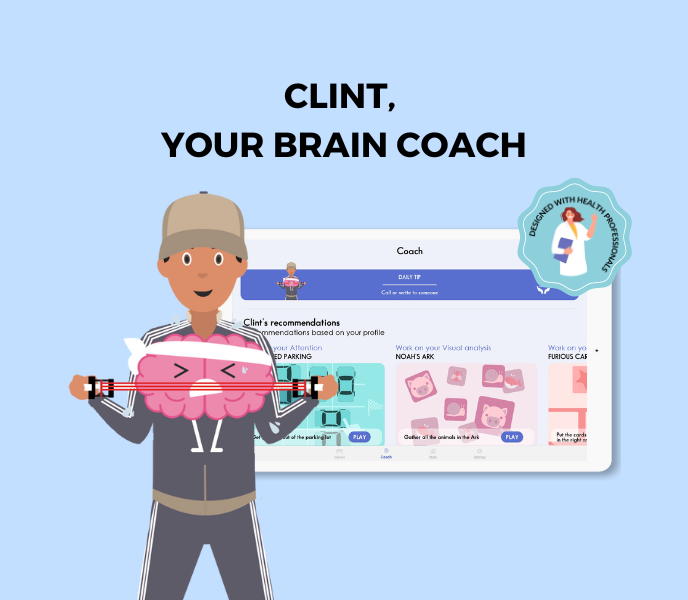
CLINT, YOUR BRAIN COACH
With your JOE brain coach, you choose which cognitive functions to target: attention, concentration, executive functions, mental agility, strategy implementation, etc. A fun, efficient program that supports you every day.
Other articles that might interest you:
How Parents Can Contribute to Teacher Training
As we delve into the realm of education, it becomes increasingly clear that teacher training is not merely a...
Differentiated Instruction Approaches: Training and Practical Application
Differentiated instruction is a pedagogical approach that recognizes the diverse needs of students in a classroom. It...
Key Skills Teachers Need to Support Students with Special Needs
As we embark on our journey to support children with special needs, it is essential for us to cultivate a deep...


